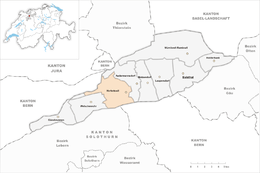Herbetswil
| Herbetswil | ||
|---|---|---|

Herbetswil village
|
||
|
||
| Coordinates: 47°18′N 7°36′E / 47.300°N 7.600°ECoordinates: 47°18′N 7°36′E / 47.300°N 7.600°E | ||
| Country | Switzerland | |
| Canton | Solothurn | |
| District | Thal | |
| Area | ||
| • Total | 16.31 km2 (6.30 sq mi) | |
| Elevation | 524 m (1,719 ft) | |
| Population (Dec 2015) | ||
| • Total | 533 | |
| • Density | 33/km2 (85/sq mi) | |
| Postal code | 4715 | |
| SFOS number | 2424 | |
| Surrounded by | Aedermannsdorf, Balm bei Günsberg, Farnern (BE), Gänsbrunnen, Günsberg, Rumisberg (BE), Seehof (BE), Welschenrohr | |
| Website |
www SFSO statistics |
|
Herbetswil is a municipality in the district of Thal in the canton of Solothurn in Switzerland.
Herbetswil is first mentioned in 1400 as Hebrechtzwilre.
Herbetswil has an area, as of 2009[update], of 16.31 square kilometers (6.30 sq mi). Of this area, 5.67 km2 (2.19 sq mi) or 34.8% is used for agricultural purposes, while 10.1 km2 (3.9 sq mi) or 61.9% is forested. Of the rest of the land, 0.56 km2 (0.22 sq mi) or 3.4% is settled (buildings or roads), 0.01 km2 (2.5 acres) or 0.1% is either rivers or lakes and 0.01 km2 (2.5 acres) or 0.1% is unproductive land.
Of the built up area, housing and buildings made up 1.4% and transportation infrastructure made up 1.5%. Out of the forested land, 58.7% of the total land area is heavily forested and 3.2% is covered with orchards or small clusters of trees. Of the agricultural land, 5.0% is used for growing crops and 6.7% is pastures and 22.4% is used for alpine pastures. All the water in the municipality is flowing water.
The municipality is located in the Thal district, in the Dünnern river valley. It consists of the haufendorf village (an irregular, unplanned and quite closely packed village, built around a central square) of Herbetswil and the hamlets of Vorder and Hinter Hammer.
The blazon of the municipal coat of arms is Gules an Angle Plate Sable.
Herbetswil has a population (as of December 2015[update]) of 533. As of 2008[update], 5.4% of the population are resident foreign nationals. Over the last 10 years (1999–2009 ) the population has changed at a rate of -8.4%.
Most of the population (as of 2000[update]) speaks German (546 or 96.1%), with Albanian being second most common (5 or 0.9%) and Arabic being third (5 or 0.9%). There are 3 people who speak French.
...
Wikipedia




